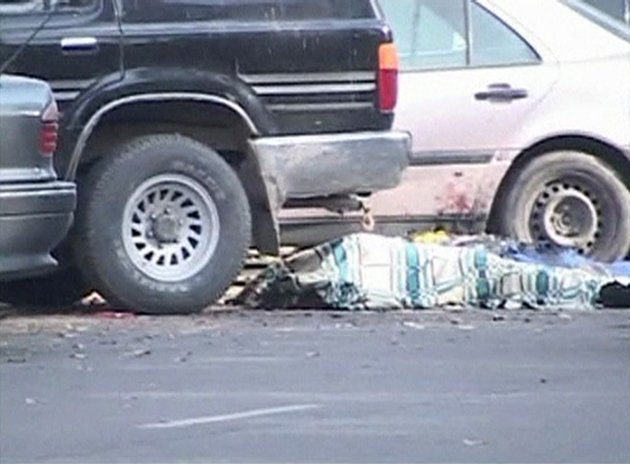
Militants Escalate Terrorist Attacks In Kazakhstan
Publication: Eurasia Daily Monitor Volume: 8 Issue: 211
By:

Kazakhstan, once depicted as an island of stability invulnerable to the encroachments of Islamist extremists is no longer a safe place in turbulent Central Asia. Over the last seven months the Muslim-dominated country was shaken by a series of terrorist attacks in several cities in western and southern Kazakhstan.
On the morning of November 12, shootings and bomb blasts threw the residents of the city of Taraz, home to 352,500 people in Zhambyl region (southern Kazakhstan) into panic. Eyewitnesses told journalists that at about 9:30 a.m., an unidentified man broke into a gun shop killing a guard, a shop assistant and a customer before escaping with firearms and ammunition. Several minutes later shots and explosions were heard at the regional government office located nearby.
Local authorities did not comment on the incident. However, later in the day, the Deputy Prosecutor-General Nurmakanbet Isaev briefed journalists and said that the attack was carried out by Maksut Kariev, an Islamic militant. Correcting the figure earlier given by the interior ministry, Isaev stated that the terrorist had killed seven people, including two National Security Committee (KNB) agents who had tried to detain him. Kariev blew himself up and in the process he killed one police officer. The deputy prosecutor-general could not contain his irritation with Internet and social network resources for “misinforming” the public and “reporting that there were four explosions, but in fact there was only one.” At the same time he admitted that law enforcement bodies were slow to comment on the attack, adding that they needed time to assess the situation to avoid panicking the local population (RIA Novosti Kazakhstan, November 12).
Kazakh authorities have long denied the existence of terrorist organizations in Kazakhstan and even excluded the possibility of an extremist attack. On May 17, this year, a suicide bomber blew himself up outside the KNB office in Aktobe region, injuring four security officers, and the authorities refused to acknowledge that the incident was an act of terrorism. In July, they were equally reluctant to link the killing of two policemen and shootouts in the Shubarshi and Kenkiyak settlements in that same region to terrorism. But a similar attack occurred in Almaty on November 9, when two policemen were killed by gunfire from a passing car. Interior Ministry officials indirectly admitted “the possibility of a terrorist attack” (KTK TV, November 9).
The clearest admission of the existence of a terrorist organization in Kazakhstan came on November 8, from the Prosecutor-General’s Office, after bomb explosions in the city of Atyrau on October 31, perpetrated by Islamic extremist militants belonging to the Jund al Halifat (Soldiers of the Caliphate) terrorist organization (see EDM, November 11). The Soldiers of the Caliphate, which propagates the militant ideas of Aleksandr Tikhomirov (a convert to Islam with an adopted name Said Buryatsky, killed in North Caucasus in March 2009) was founded in Kazakhstan by Rinat Habiulla. His typically Tatar name points to the multiethnic nature of that organization. Ravil Kusainov, one of the leaders of the Soldiers of the Caliphate, also bears a Tatar name, and in an interview to Minbar Media Project he said his organization consists of nationals from different countries. He called on his supporters of different national origins “to draw lessons from the Arab Spring and get rid of their governments” (www.vesti.kz, November 10).
Ravil Kusainov’s militant rhetoric came immediately after the briefing held by Nurdaulet Suindikov on November 9, a spokesman for the Prosecutor-General’s Office, who stated that the double explosions in Atyrau were being thoroughly investigated while revealing the names of the suspects: Mirhat Kalkamanov, Alimzhan Sagenov and Meirambek Usabayev. But it is obviously too early for law enforcement bodies to claim any victory. The Kazakhstan cell of the Soldiers of the Caliphate are known to have established contacts with extremist organizations in Afghanistan in September 2011, and key figures, Rinat Habidulla, Orynbasar Munatov and Damir Znaliev are hiding in the border area of Afghanistan and Pakistan and taking part in combat operations against NATO forces in Afghanistan from Khost province in coordination with the Haqqani group of Taliban militants (Ak Zhaik, November 4).
There are several factors that explain the sudden surge of religious extremism in Kazakhstan. In May of this year, the first warning came from the Taliban who accused Kazakhstan of supporting NATO forces in Afghanistan. An Internet website carried a threat by the Soldiers of the Caliphate, who demanded the repeal of the new religious law signed on October 13 by President Nursultan Nazarbayev. It appears that Islamist extremists are not only targeting the power structures, trying to frustrate government institutions, but also they are attempting to disrupt economic ties between Kazakhstan and western companies. In oil-producing Atyrau, according to statistics released by the regional government (akimat) foreign investments in 2010 reached 72.5 percent of the total investment volume in the region.
The proximity of Atyrau to Astrakhan region in Russia, easily accessible for Chechen rebel fighters, also plays a role in spreading ideas of Jihad to Kazakhstan. Experts note the similarity of the methods and tactics of the Soldiers of the Caliphate in Kazakhstan to those used by Islamist militants in Dagestan, who target the police force and government structures. But so far, the response from the authorities in Kazakhstan to the escalating terrorist crisis is far from adequate.




